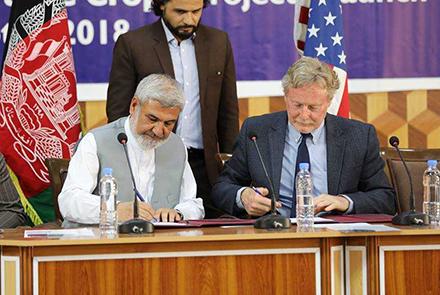Ministry of Agriculture, Irrigation and Livestock (MAIL) and the United States Agency for International Development (USAID) on Tuesday signed an agreement based on which USAID will invest $110 million in the agriculture sector in the next five years.
The money will be invested in two projects, Afghanistan Value Chains (AVC) and High Value Crops (HVC) to improve Afghanistan’s agricultural sector.
The projects will be implemented by the private sector under supervision of MAIL.
According to officials, the projects aim to create jobs and increase rural income through support to key actors along the value chains.
MAIL Minister Nasir Ahmad Durrani said at the agreement signing ceremony in Kabul the money will be invested in developing Afghanistan’s agricultural sector in the next five years.
According to Durrani, with the implementation of these projects, agricultural products will increase by 30 percent which in turn will increase Afghanistan’s exports of agricultural products to other countries.
“With the implementation of these projects, the private sector companies will export the high quality and high valued agriculture and livestock products to the international markets,” said Durrani.
USAID mission director Herbie Smith said at the ceremony the United States is committed to supporting Afghanistan in finding new markets for its agricultural products which will lead to economic growth in the country.
“These projects will be implemented by DAI global and will be employed throughout Afghanistan with a focus on large market centers of Herat, Mazar-e-Sharif, Jalalabad, Kandahar and Kabul. As you all know agriculture is the heart of Afghanistan’s economy. Over 70 percent of the population is engaged in agriculture, whether they are farmers, herders, agriculture business managers or traders,” said Smith.
According to Smith, these projects will help farmers access national and international markets and increase produce.
“The U.S. government is committed to supporting Afghanistan by promoting market-driven, private sector-led economic growth,” said Smith.
Afghanistan Chamber of Commerce and Industries Atiqullah Nusrat meanwhile said at the same event investors should be encouraged to invest in the agriculture sector.
“I am sure that the projects they have announced will help overcome the problems and also will provide conditions for investment by the private sector in different fields,” said Nusrat.
According to officials, the two projects will focus on increasing the productivity and competitiveness of key businesses in the market centers of Kabul, Herat, Mazar-e-Sharif, Jalalabad, and Kandahar. These businesses, known as ‘anchor firms,’ will receive support to improve their business standards and management in order to meet the quality and quantity demands of domestic and international markets.
According to MAIL and USAID officials, the firms will drive sustainable increases in employment and incomes both in their own enterprise and their supporting producer networks.
In the meantime, USAID in a press release said the projects will increase value chains by more than 30 percent in the next five years.
“The programs are anticipated to increase productivity in their target value chains by more than 30 percent over the next five years. Together, they will support Afghan enterprises in engaging in $140 million in additional sales, and catalyze an additional $65 million in agricultural investments,” read the statement.

